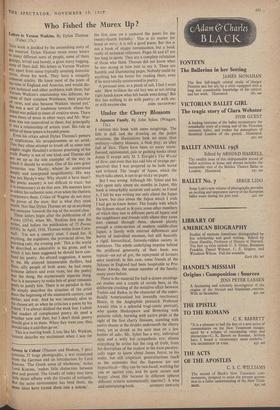Who Fished the Murex Up?
Letters to Vernon Watkins. By Dylan Thomas. (Faber, 15s.)
Tins book is justified by the astonishing unity of tthe material. Dylan Thomas wrote many letters 0 many different sorts of people, some of them gossipy, trivial and bawdy, a great many begging, none of them dull. His letters to Vernon Watkins are, apart from some typically amusing domestic trivia, about his work. They have a uniquely Foherent quality. He knew most of the poets of
time in England and America, and would dis- _cuss technical and other problems, with them, but Vernon Watkins's relationship was different, be- cause of their common Welshness, their practice 9f verse, and also because Watkins 'stayed put.' H was a sort of loadstone 'towards whom his rend was pulled in times of creative stress. There Were times of stress in other ways, and Mr. Wat- ins was not uninvolved in these; but principally it was a relationship of artistic trust. His role as editor of these letters is beyond praise.
Even his critics admit Dylan Thomas's powers of application, his scrupulousness as an artist. T. his they often attempt to brush off as some tent Juggler might Houdini's arduous practising of his craft. Poetry is not of one kind, and Thomas did not set up as the sole exemplar of the way in Which it should be written. One of his own great favourites was Hardy, whom he understood deeply and interpreted magnificently. His way WaS not Hardy's way. Why should it have been?
Poetic ancestry is not difficult to trace; but it is unnecessary to do that now. His enemies have to admit his authentic note, even when the rhetoric overpowers them. Critics of Wagner do not deny the power of the man; that is what they most resent. Not that Dylan Thomas set up as anything but someone 'towards the top of the second class.' These letters begin after the publication of 18 Poems (1934), when Mr. Watkins first met the writer, and before the publication of 25 Poems (1936). In April, 1936, Thomas writes from Corn- Wall : 'I'm not a country man; I stand, for, if, anything, the aspidistra, the provincial drive, the morning cafe, the evening pub.' This is the world he described so admirably in his prose, and to Which it has been suggested he should have con- fined his poetry. An absurd suggestion, it seems to me. He enjoyed innumerable thrillers, bad films, silly 'people of both sexes; he had many tiresome defects and even vices; but the poetry Was the thing, the mysteriously separate thing. Nor is it necessary to make lists of great romantic Poets to justify him. There is no paradox in this. 1-le simply describes the situation of the artist since the beginning of the nineteenth century, and earlier, and ever. And he was intensely alive to his chosen art, as when he criticises a poem by his friend, 'I've always disliked the weak line. I admit that readers of complicated poetry do need a breather now and then, but I don't think poetry should give it to them. When they Want one, they Should take it and then go on.'
. This is a moving book. I, too, like Mr. Watkins, cannot describe my excitement when I saw for
the first time on a postcard the poem for his twenty-fourth birthday.' This is no matter for boast or envy; it is still a good poem. But this is not a book of sloppy reminiscence, but a book really of technical reference. Pages 66 and 67 are too long to quote. They are a complete refutation of those who think Thomas did not know what he was saying or how best to say it. These are humble,and illuminating pages. Nobody' could be anything but the better for reading them, even if he were totally uninterested in poetry.
A personal note, as a pinch of salt, I feel I must add: How brilliant the old boy was at not letting right hands know what left hands were doing! But this has nothing to do with poetry; or with me;


































 Previous page
Previous page